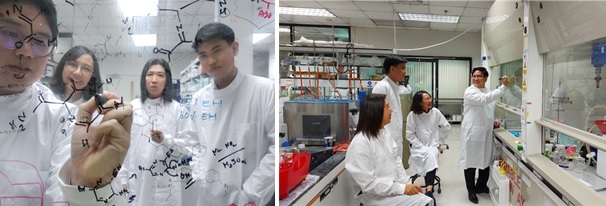Dr. Nitipol Srimongkolpithak, BIOTEC Researcher of Frontier Biodesign and Biomolecular Engineering Research Team, recently shared the development of favipiravir API synthesis process in NSTDA special seminar.

Dr. Nitipol led a 2-person team embarking on the synthesis of favipiravir API in February 2020 when favipiravir, an antiviral used to manage influenza, was reported to be effective against the SARS-CoV-2, the virus that causes COVID-19. API or Active Pharmaceutical Ingredient is the active ingredient contained in medicine, and favipiravir API is therefore a key to the production of the drug to treat COVID-19 patients. Though the number of COVID-19 cases in Thailand was still low at the time, Dr. Nitipol expected that importation of favipiravir would become difficult when cases started piling up as countries would stock up their supplies. Although Thai local manufacturers were able to formulate and produce favipiravir, its active ingredient needed to be imported from China and Japan, due to the lack of technology to synthesize favipiravir API. As API importation would also become limited when the disease spread widely, it was vital to bolster domestic capability in favipiravir API manufacturing.

After a series of experiments, Dr. Nitipol received research fund from the Government Pharmaceutical Organization (GOP) the pursue the research in full force and his research team and partners, including PTT Innovation Institute, started to grow. A lab-scale favipiravir API synthesis process was finally developed, utilizing raw materials easily sourced and cost effective.

This lab-scale process, less than 10L production, has been transferred to GPO for a joint study to scale up to a pilot process, 10L-200L production. A patent application for this synthesis process has been filed early this year.
Dr. Nitipol and his team are now staying ahead of the game by working on new drugs, as infections can become drug-resistant over time.
This project is an example of BCG action that aims to employ the concept of bioeconomy, circular economy and green economy to drive the national development, focusing on four sectors: agriculture and food; medical and wellness; energy, biomaterial and biochemical; and tourism and creative economy. Under the medical and wellness industry, the government aims to build capability in to develop and commercialize drug, vaccine, advanced therapy medicinal products (ATMPs) and genomic medicine.
